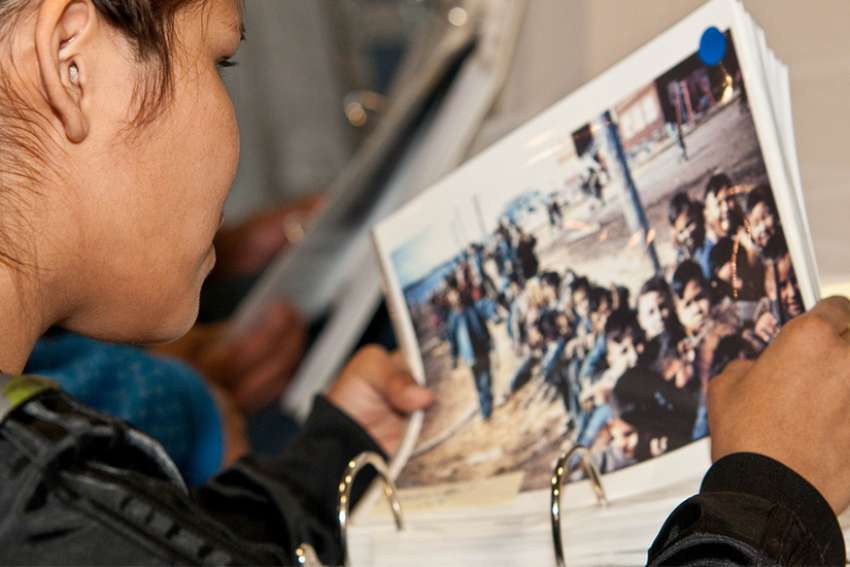Such is the circumstance these days seeing Indigenous recognition, reconciliation and rights cresting with inexorable momentum, and distinguishing in it at least the possibility of a similar sea change for the Church and, indeed, for the public life of faith in Canada.
On March 27, after all, Prime Minister Justin Trudeau offered a historic apology and official exoneration for six members of the Tsilhqot’in nation unjustly captured and hanged in B.C. during what is known as the Chilcotin War in 1864.
No one disputes the six were culpable in killing 21 whites who were illegally pushing a road across Tsilhqot’in territory to the Fraser River gold fields. But their descendants have long argued they were legitimate warriors waging a defensive battle for their lands, not common criminals to be tricked, tried and executed. God’s justice appears, 154 years later, to have finally been gained.
In a seemingly lesser, but really no less remarkable way, one day after the prime minister’s apology, God’s hand seemed to be guiding the writing of editorials at no less a place than The Toronto Star. With almost Old Testament zeal, a Star editorial appeared as from a cloud, raining castigation on the Liberal government for perfidy toward faith groups in the Canada Summer Jobs “values test” debacle.
Now, a fair first reaction would be that these two events are not on the same planet, never mind waves in the same ocean. One involves brutal killings from a bloodthirsty era. The other seems part of the passing political ephemera of the day, representing damage an inexperienced government has inflicted on itself through ideological blindness.
In reality, though, that’s the distorting effect of comparing “then” and “now” without considering what happened in between. In the case of Indigenous peoples, a critical thing that happened was the issuance, by the father of the current prime minister, of a 1969 white paper on the future of “Indians” in Canada.
It was marketed as discussion. Its mode was a quintessential Pierre Elliott Trudeau directive: “Indians” had no future in Canada as “Indians.” The entire post-colonial apparatus supporting “Indian” life should be dismantled, and “Indians” assimilated as “Canadians.”
From that misbegotten paternalism emerged today’s proud, defiant, unapologetic Indigenous leaders. The white paper galvanized Indigenous political forums into vehement opposition. A line had at long last been crossed, and pushback began.
Over the decades, Indigenous people have done more than pick themselves up from the mud of Confederation. They’ve gained political power to go beyond being fully part of Canada. They’ve reached the point where Canada is unimaginable without them. That is a cresting wave hitting shore.
Catholic hope, then, prompts the question: Given the history that continues to be played out for Indigenous people, why should the same dynamic not be available to the Church, to all people of faith, to reclaim a Canada that is unimaginable without us?
Granted, we do not suffer the vile cruelties of material deprivation inflicted on Indigenous people for 150 years and which many continue to endure. But do we not, spiritually speaking, also suffer marginalization, disregard and diminishment? Are we not routinely ridiculed, stereotyped, told impolitely to shut up or at least speak only behind closed doors? Yes, to answer my own questions, we are.
Prime evidence is a federal government feeling emboldened enough to seek to impose a “values test” that violates our most profound religious beliefs. For what? For the mere chance to request public dollars, that’s what.
The galvanized opposition of people of faith to that very imposition may one day stand as our line that was finally crossed.
History will tell, of course, but that wave on the horizon might well be a long hoped for turning of the tide.
(Stockland is publisher of Convivium.ca and a senior fellow with Cardus.)
Peter Stockland: It’s our turn to ride the wave of change
By Peter StocklandThere is a deeply Catholic sense of hope in standing on history’s shore watching a major wave break while sensing another building, barely visible, on the horizon.
Please support The Catholic Register
Unlike many media companies, The Catholic Register has never charged readers for access to the news and information on our website. We want to keep our award-winning journalism as widely available as possible. But we need your help.
For more than 125 years, The Register has been a trusted source of faith-based journalism. By making even a small donation you help ensure our future as an important voice in the Catholic Church. If you support the mission of Catholic journalism, please donate today. Thank you.
DONATE

